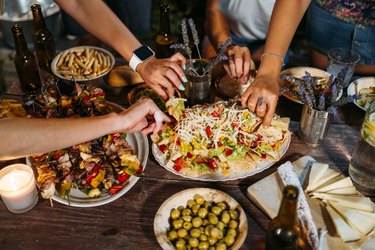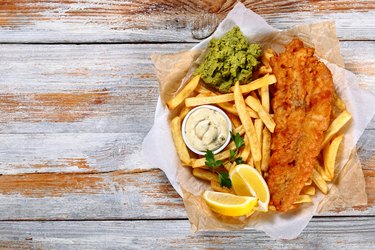
When you're craving french fries, a chocolate shake or a juicy steak, that simply means you want to eat these delicious foods and you want them now, right? Not necessarily.
According to Tiffany Mendell, RDN, CDN, a New York-based registered dietitian-nutritionist, there are several physiological reasons behind your cravings. The severity and frequency of your food hankerings can be affected by a combination of unhealthy lifestyle factors, such as being dehydrated, lack of sleep and an unbalanced diet.
Video of the Day
Video of the Day
Making sure that you get enough healthy fat, protein and complex carbohydrates to satisfy you is important for keeping cravings at bay. Stress can also play an important role: "It's hypothesized that cortisol — one of the body's stress hormones — may potentiate the reward system in the brain with food and cravings, making it more difficult for a person to resist a craving," Mendell tells LIVESTRONG.com.
And, of course, insufficient sleep can also have an effect by altering the body's hunger hormones and causing us to produce more of a hormone called ghrelin (which increases hunger and appetite) and less leptin (aka the satiety hormone), according to a March 2016 study published in the journal Sleep.
Read on to find out what's possibly behind your cravings, and how you can honor them in a way that's good for your body
1. If You're Craving Salty Foods, You May Be Dehydrated

Dehydration — whether it's because you drank too much alcohol last night, are on a long flight or another thirst-inducing situation — can come with some serious cravings for salt.
"Sodium is a major electrolyte in the body; electrolytes (which are minerals) help to maintain fluid balance in the body," Mendell says. "Dehydration is essentially a loss of electrolytes and fluid that can occur from excess sweating, heavy alcohol intake or vomiting/diarrhea. So a craving for salt could indicate dehydration as the body is looking to restore electrolyte and fluid balance."
Additionally, some research has shown that salt cravings can indicate mild calcium deficiency in the body, according to the Institute of Medicine. However, more research needs to be done in order to solidify the connection between salt cravings and a need for calcium-rich foods.
A Healthy Way to Satisfy Your Craving
Good choices for salty food cravings include dried seaweed, tomato juice, salted almonds or broth.
2. If You're Craving Fatty Foods, You May Need More Sleep

As Mendell explained, not catching enough zzzs can alter the body's hunger hormones, ghrelin and leptin. There's also research showing that sleep deprivation can cause a person to eat an average of 385 extra calories the next day, according to a November 2016 meta-analysis in the European Journal of Clinical Nutrition.
What's more, lack of sleep can have a direct effect on cravings — and one type of food in particular. "Insufficient sleep can also raise the blood level of chemical compounds called endocannabinoids," Mendell says. "This increases the reward value of food and causes cravings for high-fat, calorie-dense foods." If you typically struggle with intense food cravings, try to focus on improving your sleep habits and hygiene.
A Healthy Way to Satisfy Your Craving
Opt for healthy fats such as avocado, nuts and nut butter, seeds and fish over fried foods.
3. If You're Craving Sugary Foods, You May Need to Eat a More Balanced Diet

Sugar cravings can happen for a few reasons. "Repeated exposure to overly sweet foods skews people's taste buds," Mendell says. "It makes less sweet foods like fruit and vegetables seem less palatable."
This is particularly bad news for people who take in a lot of artificial sweeteners (think: diet sodas and sugar-free snack foods), which are 200 to 600 times sweeter than table sugar, per a June 2010 study in the Yale Journal of Biology and Medicine.
Additionally, if your diet is too high in refined carbohydrates — which can cause a rapid spike and drop in blood sugar levels — you'll crave sugary foods to raise your blood sugar again.
A Healthy Way to Satisfy Your Craving
If you simply can’t resist your craving for your sweet treat of choice, try eating a small portion of it after eating a balanced meal first. And if you know you won't be able to stick with a small piece, opt for some fresh fruit or a square of dark chocolate.
The Bottom Line on Cravings
When it comes to resisting cravings, Mendell reminds us that it's not always about willpower. In fact, foods that are high in sugar and salt — namely, processed foods — have a powerful effect on our brains and keep us wanting more.
That's why it's so difficult for you to stop eating a bag of pretzels while a bag of carrots is an entirely different story. "Our taste buds are very malleable and repeated exposure tends to influence our taste buds to prefer certain foods," she says.
So if you want to stop craving processed foods high in sugar and salt, start with a diet of mostly unprocessed, whole foods, and your taste buds should adjust accordingly.
- Sleep: "Hungry for Sleep: A Role for Endocannabinoids?"
- Journal of American Dietetic Association: "Chocolate: Food or Drug?"
- The Yale Journal of Biology and Medicine: "Gain Weight by 'Going Diet?' Artificial Sweeteners and the Neurobiology of Sugar Cravings"
- National Academies Press: "Taste and Flavor Roles of Sodium in Foods: A Unique Challenge to Reducing Sodium Intake"
- European Journal of Clinical Nutrition: "The Effects of Partial Sleep Deprivation on Energy Balance: A Systematic Review and Meta-analysis"
Was this article helpful?
150 Characters Max
0/150
Thank you for sharing!
Thank you for your feedback!